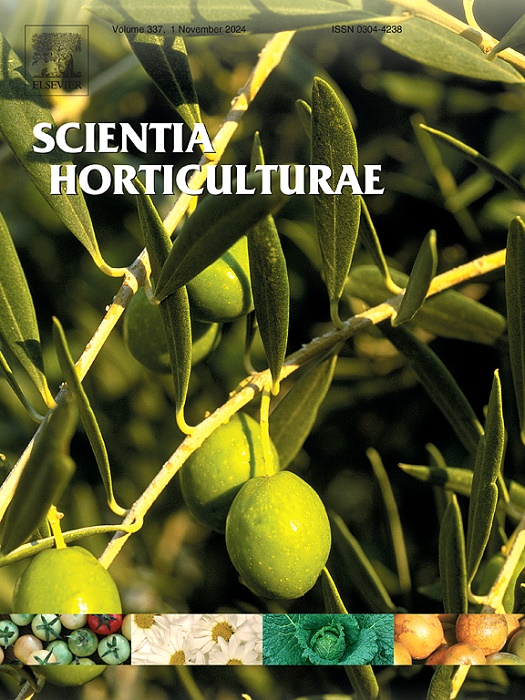牡丹根系发育过程中KNOX基因的鉴定与表征
IF 3.9
2区 农林科学
Q1 HORTICULTURE
引用次数: 0
摘要
牡丹是一种具有观赏和工业价值的园艺作物,特别是其根含有药物。KNOX基因是调控植物根、茎等器官发育的重要基因,但其在牡丹根中的功能尚不明确。牡丹中KNOX基因的鉴定可能有助于根系发育。本研究共从牡丹中鉴定出8个PoKNOX基因,并根据其染色体位置进行命名。他们被分为I类、II类和KNATM类。基因结构和共线性分析突出了KNOX蛋白的功能相关性。此外,PoKNOX8和PoKNOX7定位于细胞核,并在根组织中高表达,因此选择进行功能分析。顺式作用元件分析和GUS染色揭示了它们对植物激素信号的响应。构建了以PoKNOX基因为核心的调控网络,通过GO富集分析,这些基因与根发育和激素应答有关,说明KNOX基因参与了根的调控。BiFC分析显示,PoKNOX8分别与PoKNOX7和PoKNOX1相互作用,证实了上述预测。这些工作为探索KNOX基因调控牡丹根系发育的机制提供了参考。本文章由计算机程序翻译,如有差异,请以英文原文为准。
Identification and characterization of the KNOX genes in tree peony during root development
Tree peony is a horticultural crop with both ornamental and industrial value, especially its roots contain pharmaceuticals. The KNOX genes are essential in regulating the development of various organs in plants, including root and shoot, but their function of roots in tree peony poorly characterized. The identification of KNOX genes in tree peony may contribute to root development. In this study, a total of 8 PoKNOX genes were identified from tree peony and named based on their chromosome location. They were divided into class I, class II and KNATM. Gene structure and collinearity analysis highlighted the functional correlation of KNOX protein. Moreover, PoKNOX8 and PoKNOX7 were localized in the nucleus and highly expressed in root tissues and were therefore selected for functional analysis. Cis-acting element analysis and GUS staining revealed their response to plant hormone signals. A regulatory network was constructed with PoKNOX genes as the core, and these genes were related to root development and hormone response according to GO enrichment analysis, indicating that KNOX genes should be involved in root regulation. The BiFC assay revealed that PoKNOX8 interacted with PoKNOX7 and PoKNOX1 respectively, and confirmed the prediction. These works provide a reference for exploring the mechanism of KNOX genes regulating root development of tree peony.
求助全文
通过发布文献求助,成功后即可免费获取论文全文。
去求助
来源期刊

Scientia Horticulturae
农林科学-园艺
CiteScore
8.60
自引率
4.70%
发文量
796
审稿时长
47 days
期刊介绍:
Scientia Horticulturae is an international journal publishing research related to horticultural crops. Articles in the journal deal with open or protected production of vegetables, fruits, edible fungi and ornamentals under temperate, subtropical and tropical conditions. Papers in related areas (biochemistry, micropropagation, soil science, plant breeding, plant physiology, phytopathology, etc.) are considered, if they contain information of direct significance to horticulture. Papers on the technical aspects of horticulture (engineering, crop processing, storage, transport etc.) are accepted for publication only if they relate directly to the living product. In the case of plantation crops, those yielding a product that may be used fresh (e.g. tropical vegetables, citrus, bananas, and other fruits) will be considered, while those papers describing the processing of the product (e.g. rubber, tobacco, and quinine) will not. The scope of the journal includes all horticultural crops but does not include speciality crops such as, medicinal crops or forestry crops, such as bamboo. Basic molecular studies without any direct application in horticulture will not be considered for this journal.
 求助内容:
求助内容: 应助结果提醒方式:
应助结果提醒方式:


